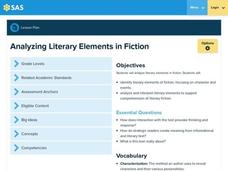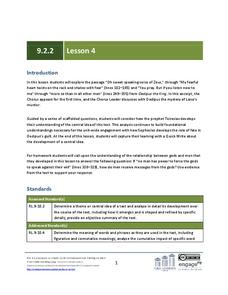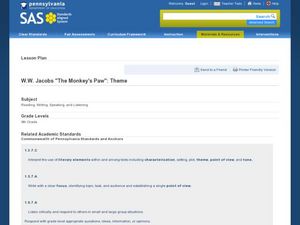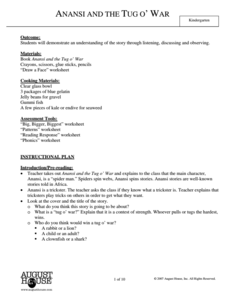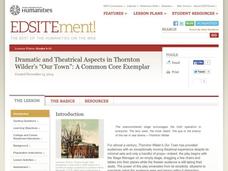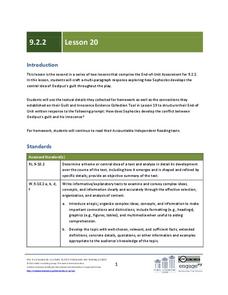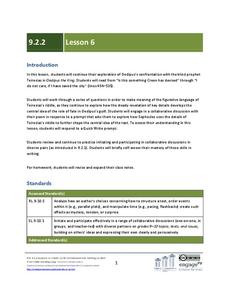Curated OER
Fifties/Sixties Musical Playwriting Workshop
Students write a coherent script based on characterization, theme, conflict and emotional tone as found in the songs' lyrics and develop an understanding of the enjoyment that comes through discipline and hard work leading toward a...
Curated OER
Chocolate Chaos
Second graders demonstrate the ability to examine the elements of a story (theme, plot, setting, mood) and characters, by discussing and writing about each. They have fun with chocolate related activities and enjoy reading about some...
Pennsylvania Department of Education
Analyzing Literary Elements in Fiction
Students analyze the characters and events in fictional writing. In this literary elements instructional activity, students study the meaning of the words characterization and fiction. They listen to the story Pigsty by Mark Teague, or...
Curated OER
Introducing Literary Elements in Fiction
Identify literary elements in fiction. In this reading comprehension lesson, learners read the book Pigsty and record literary elements onto a graphic organizer. They specifically discuss the main characters and events in the text.
EngageNY
Grade 9 ELA Module 2, Unit 2, Lesson 4
The concept of sight, whether it's a lack of sight or abundant sight of the future, plays a vital role in Sophocle's Oedipus the King. Develop your ninth graders' literary vision with a lesson plan that connects the prophecy of Teiresias...
National Endowment for the Humanities
Hamlet and the Elizabethan Revenge Ethic in Text and Film
Young scholars research the social context of Elizabethan England for Shakespeare's "Hamlet". They identify cultural influences on the play focusing on the theme of revenge and then analyze and compare film interpretations of the play.
Curated OER
W.W. Jacob's "The Monkey's Paw" Theme
Students identify the theme of "The Monkey's Paw" and relate it to prior knowledge. In this "The Monkey's Paw" lesson, students discuss fate and coincidence and debate which one controls destiny. A test is chosen as the winner based on...
Curated OER
Common Theme in Folktale: 900 Versions of Cinderella
Seventh graders examine various stories that have a Cinderella theme. In this Language Arts lesson, 7th graders compare and contrast stories. Students write various journal assignments in regards to the stories.
Curated OER
Kumeyaay Indians
Useful for literary analysis, citing textual evidence, or summary skills, this lesson about the Kumeyaay Indians would be a good addition to your language arts class. Middle schoolers read novels and summarize the literature in their own...
EngageNY
Making Inferences: The Golden Rule and the Radley’s Melancholy Little Drama (Chapter 4)
Time for a TED Talk. Class members watch a TED Talk clip covering Karen Armstrong and the Golden Rule. Once finished, they use Turn and Talk to discuss the questions in their Golden Rule Note-catchers. As a closing, they reflect on the...
Childnet International
Cyberbullying Drama
Target, bystander, or bully? Class groups watch a short student-produced video about cyberbullying and then devise and script their own drama to encourage discussion about this hot button topic.
National Endowment for the Humanities
The Glass Menagerie as Expressionist Theatre
The first lesson in a three-part unit has high schoolers examine The Glass Menagerie as an example of expressionist theatre. After reading a short article about expressionism, scholars list expressionist techniques in Tennessee Williams'...
EngageNY
Grade 9 ELA Module 2, Unit 2, Lesson 15
The terrible truth begins in a instructional activity that focuses on the final act of Sophocles' Oedipus the King. As ninth graders collect evidence that details the origin of Oedipus and how his birth relates to the prophecy everyone...
National Endowment for the Humanities
The Glass Menagerie: Impact of Expressionism
Young scholars are challenged to write a realistic analysis of Tennessee Williams' nonrealistic memory play, The Glass Menagerie. Writers use the evidence gathered on their worksheets to craft an effective thesis and concluding statement...
August House
Anansi and the Tug o' War
Combine art, math, language arts, drama, and delicious Jell-o with a instructional activity based on the African folktale Anansi and the Tug o' War. Kids make predictions and discuss plot points of the story before joining in...
BBC
Tales of Hans Christian Andersen
Fairy tales seem like quick, fun children's stories, but asking compelling questions about characters, plot elements, and literary themes can transform them into rich and complex tales. Use a series of eight lessons on Hans Christian...
Curated OER
Lots of Lessons from Aesop
Aesop’s Fables offer young learners an opportunity to study figurative language. After reviewing theme, simile, alliteration, and metaphor, model for your pupils how to identify examples of these devices in the fable. Class members then...
National Endowment for the Humanities
Dramatic and Theatrical Aspects in Thornton Wilder’s “Our Town”: A Common Core Exemplar
“So I’m going to have a copy of this play put in the cornerstone and the people a thousand years from now’ll know a few simple facts about us.” Our Town is used as the text in a Common Core exemplar that examines the dramatic and...
Curated OER
Reviewing Literary Elements
Young scholars identify the elements of fiction, and work on compare and contrast skills.. In this comprehension lesson plan, students read different versions of Cinderella. Young scholars use a Venn diagram to compare and contrast the...
EngageNY
Grade 9 ELA Module 2, Unit 2, Lesson 10
The slow curse of realization begins to sink in during the tenth lesson in a literary analysis unit on Sophocles' Oedipus the King. Ninth graders carefully read the selected lines for evidence of Oedipus' feelings during a turning point...
EngageNY
Grade 9 ELA Module 2, Unit 2, Lesson 20
Oedipus' lack of literal and figurative vision does not mean he cannot see his guilt in the terrible fates of Laius, Jocasta, and all the lives touched by prophecy. Conclude a literary analysis unit on Sophocles' Oedipus the King with a...
EngageNY
Grade 9 ELA Module 2, Unit 2, Lesson 6
The battle of wits and wisdom rages in Sophocles' Oedipus the King, particularly in Oedipus' discussion with Teiresias about the Sphinx's riddle. Ninth graders focus on this crucial conversation with a literary analysis instructional...
EngageNY
Author’s Craft: Poetry and Prose
During a drama circle, scholars closely examine the play created in the play A Midsummer Night's Dream. The pupils read Act 3 Scene 1 and turn and talk to their partners about the scene. They then complete a handout and discuss the...
EngageNY
Characters’ Decisions: The Flow of Consequences in Midsummer
Class members meet in their drama circles and share their thoughts on why it might be necessary for the audience to know something the characters don't. They read Act 3 Scene 2 of A Midsummer Night's Dream and complete consequence flow...




